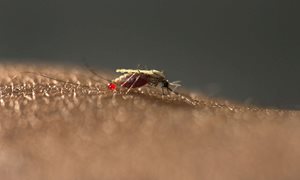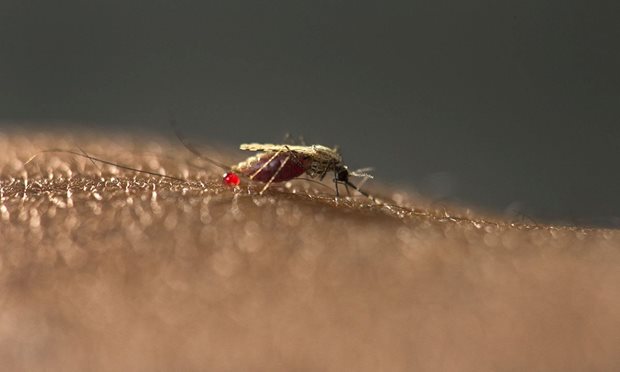Malaria is a life-threatening disease. We support the fight against malaria with fundamental and applied research activities.
Prof. Benjamin Mordmüller says: "Malaria is more than a disease. Individual, institutional, national, societal as well as scientific, cultural and economic borders must be crossed to create knowledge and interventions to have an impact on this dangerous and deadly infectious disease. With our local, national and international partnerships we aim to reduce the enormous burden of disease due to malaria."


The fight against malaria
Malaria is a life-threatening disease. It is caused by Plasmodium parasites that are transmitted between humans and Anopheles mosquitoes as part of a complicated lifecycle.
Locally, nationally and internationally we support the fight against malaria with fundamental and applied research activities on: the biology of the parasite, malaria pathophysiology, new treatments, vaccine development and large-scale interventions to eliminate this infectious disease.

Our current international projects
Photo by: Universität Tübingen, Christoph Jäckle
-
Vaccine development against placental malaria (ADVANCE-VAC4PM)
read more
Vaccine development
Malaria infection during pregnancy is a major health problem that can lead to the development of placental malaria, affecting particularly vulnerable populations of pregnant women and babies in Africa. In 2020, about 11 million pregnant women were exposed to malaria infection, which is estimated to lead to 200,000 infant deaths each year and 819,000 low birth weight infants. Placental malaria causes adverse pregnancy outcomes, including anemia, high blood pressure and low birth weight; Issues associated with a higher risk of morbidity and mortality in fetuses and neonates. The development of an effective and affordable vaccine would be critical to efficiently reduce the incidence and severity of placental malaria and protecting the mother and unborn child during pregnancy.
Funded through the Horizon Europe research funding scheme of the European Commission this project called ADVANCE-VAC4PM aims at advancing development of two vaccine candidates against placental malaria.
While phase 1a testing will take place at our premises at Radboudumc in the Netherlands, phase 1b and phase 2 trials will be conducted in collaboration with our partners in Benin and Burkina Faso.
-
Programme for Resistance, Immunology, Surveillance and Modeling of Malaria in Uganda (PRISM)
read more
PRISM
Our understanding of malaria immunity and the spread of malaria infections can benefit greatly from in-depth epidemiological studies in malaria endemic countries. In Uganda, we undertake such studies with a multi-disciplinary team of researchers from the Kampala, Nijmegen, London, Liverpool and San Francisco. Our work aims to understand all aspects of malaria transmission using tools ranging from genomic surveillance to social science. Researchers from Radboudumc specifically study the development of malaria transmission stages, infectivity to mosquitoes and immune responses that can prevent mosquitoes from becoming infected. These questions are being addressed in large longitudinal studies where individuals living in malaria endemic areas in Uganda are followed for several years under natural malaria exposure.
Funded through the US National Institutes of Health (NIH) and the European Research Council (ERC-Consolidator Grant) this project aims at supporting malaria policy in Uganda by frequent interactions with local and international policy makers.
-
The investigation of the impact of malaria on sleep and the consequences of potential sleep changes on the immune response to malaria.
read more -
For malaria control efforts, it is important to understand who forms the source of new malaria infections.
read more
Transmission networks of malaria infections
For malaria control efforts, it is important to understand who forms the source of new malaria infections. This can be done indirectly, by quantifying how infectious individuals are to mosquitoes and extrapolating the likely contribution to onward transmission. However, it can also be done more directly by studying patterns of malaria infections in space and time. In The Gambia, clinical and asymptomatic infections are being monitored over the course of several transmission seasons. Using a large panel of genetic parasite markers and information on the occurrence of malaria infections in space and time, we establish transmission networks where we identify the most likely source of newly detected infections.
Funded through the Bill & Melinda Gates Foundation and the European Research Council (ERC-Consolidator Grant) this project aims at providing evidence for international policy makers on the relative importance of asymptomatic malaria infections and low-density infections for malaria transmission.
Our team
Principal Investigator

Benjamin Mordmüller
International project manager

Ketharini Senthilkumar
International trial coordinator

Markus Gmeiner
Principal Investigator

Teun Bousema
Project coördinator



